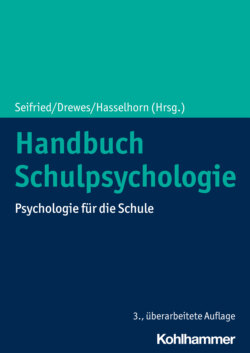Читать книгу Handbuch Schulpsychologie - Группа авторов - Страница 44
На сайте Литреса книга снята с продажи.
Literatur
ОглавлениеBDP Sektion Schulpsychologie (Hrsg.). (2015). Schulpsychologie in Deutschland. Berufsprofil. Berlin: BDP. Zugriff am 10.05.2021 unter www.bdp-schulpsychologie.de/backstage2/sps/documentpool/2015/berufsprofil.pdf
Bugl, P., Schmid, J. & Gawrilow, C. (2015). Ambulantes Assessment in der Schule: Den schulischen Alltag erfahrbar machen. Lernen und Lernstörungen, 4(4), 261–268.
Campbell, D. T. & Stanley, J. C. (1963). Experimental and quasi-experimental designs for research on teaching. In N. L. Gage (Ed.), Handbook of research on teaching (pp. 171–246). Chicago, IL: Rand McNally.
Cohen, J. (1992). Statistical Power Analysis. Current Directions in Psychological Science, 1(3), 98–101.
Cook, D. J., Mulrow, C. D. & Haynes, R. B. (1997). Systematic reviews: Synthesis of best evidence for clinical decisions. Annals of Internal Medicine, 126(5), 376–380.
Dollase, R. (2020). Schulpsychologie. In M. A. Wirtz (Hrsg.), Dorsch – Lexikon der Psychologie (19. Aufl., S. 1377). Bern: Huber.
Fisher, R. A. (1925/1946). Statistical methods for research workers (10th ed.). Edinburgh: Oliver & Boyd.
Glass, G. V. (1976). Primary, secondary, and meta-analysis of research. Educational Researcher, 5(10), 3–8.
Hasselhorn, M. & Gold, A. (2017). Pädagogische Psychologie: Erfolgreiches Lernen und Lehren (4. Aufl.). Stuttgart: Kohlhammer.
Kazdin, A. E. (1982). Single-case research designs. New York: Oxford University Press.
Mercer, S.H., Idler A.M. & Barftfai, J.M. (2014). Theory-driven evaluation in school psychology intervention research: 2007-2012. School Psychology Review, 43(2), 119–131.
Merrel, K. W., Ervin, R. A. & Gimpel-Peacock, G. (2012). School psychology for the 21st century: Foundations and practices. New York: Guilford Press.
Meyer, B. D. (1995). Natural and quasi-experiments in economics. Journal of Business & Economic Statistics, 13(2), 151–161.
Mortensen, C. R. & Cialdini, R. B. (2010). Full-cycle social psychology for theory and application. Social and Personality Psychology Compass, 4(1), 53–63.
Open Science Collaboration (2015). Estimating the reproducibility of psychological science. Science, 349, aac4716.
Paluck, E. L. & Cialdini, R. B. (2014). Field research methods. In H. T. Reis & C. M. Judd (Eds.), Handbook of Research Methods in Social and Personality Psychology (pp. 81–99). Cambridge University Press.
Petermann, R. (1996). Einzelfallanalysen. München: Oldenbourg.
Rubin, D. B. (2008a). Comment: The design and analysis of gold standard randomized experiments. Journal of the American Statistical Association, 103(484), 1350–1353.
Rubin, D. B. (2008b). For objective causal inference, design trumps analysis. The Annals of Applied Statistics, 2(3), 808–840.
Schmidt, M. (2010). Einzelfallpläne. In H. Holling & B. Schmitz (Hrsg.), Handbuch Statistik, Methoden und Evaluation (S. 63–70). Göttingen: Hogrefe.
Simmons, J. P., Nelson, L. D. & Simonsohn, U. (2011). False-positive psychology: Undisclosed flexibility in data collection analysis allows presenting anything as significant. Psychological Science, 22(1), 1359–1366.
Shadish, W. R., Cook, T. D. & Campbell, D. T. (2002). Experimental and quasi-experimental designs for generalized causal inference. Boston, MA: Houghton Mifflin.
Yong, E. (2012). Bad copy. Nature, 485, 298–300.
